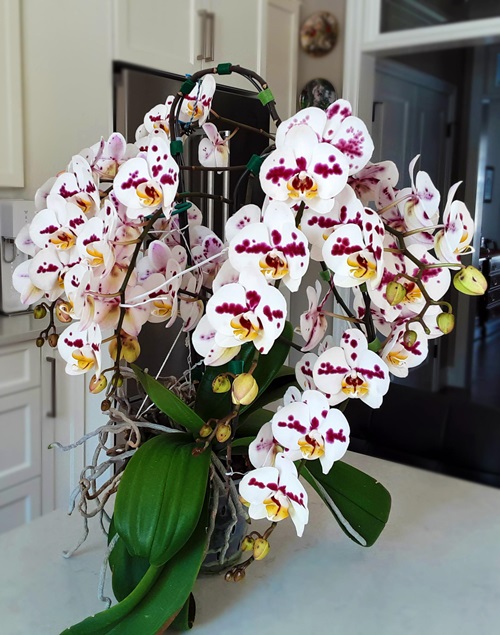Not many flowers bloom in cold and frosty weather, but these Orchids that Bloom in Winter can make your space more colorful and flowerful!
Orchids are known for their stunning beauty, and some varieties actually blossom in cooler temperatures. Get ready to be surprised by this list of orchids that bloom in winter – you might just find your new favorite houseplant!
Orchids That Bloom in Winter
1. Noble Dendrobium
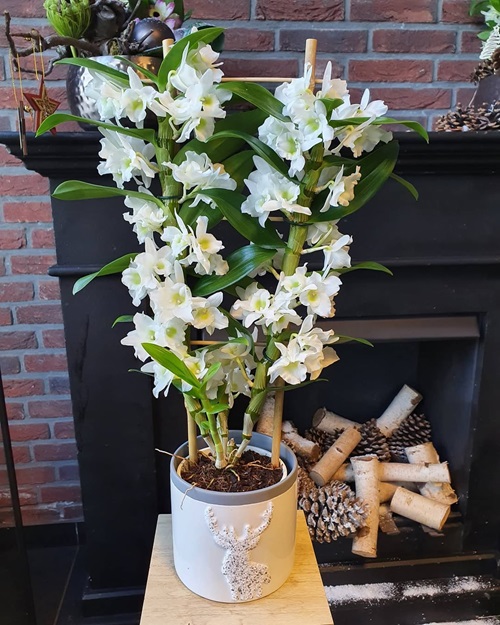
Botanical Name: Dendrobium nobile
The noble orchid actually comes from the subtropical regions of Nepal, South China, and Indo-China, where it is commonly used as an ornamental plant and for medicinal purposes.
It’s a gorgeous variety with flowers in shades of white, pink, and yellow, and it blooms in late winter and lasts until spring. Just give it bright, indirect light and watch it grow pretty. You should never overwater the plant, though. Best do it once every 8-10 days or when the medium is slightly dry.
2. Moth Orchid
Botanical Name: Phalaenopsis spp.
Moth orchids have broad, leathery leaves and short stems. They start budding in late summer or early fall and reward with stunning flowers covered in intricate patterns in late fall and all winter long; if the care requirements are met, they even continue to flower in spring.
Pro Tip: If you’re a beginner and don’t know which one to try growing, choose Moth Orchids. They are the easiest to grow and relatively tolerant of minor care variations. Their simple watering requirements also make them less prone to issues.
3. Boat Orchid
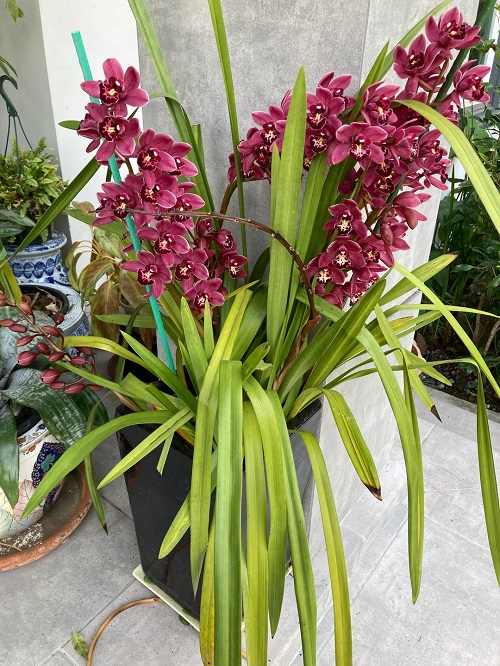
Botanical Name: Cymbidium spp.
Boat orchids are tolerant of cold and easily survive cool winters, blooming from late fall to early spring. You might even see the flowers early on in the fall if the night temperatures turn cold, as temperatures of 50-60 F (10–15 C) trigger early blooming.
Cymbidiums thrive in moist, loamy soil with indirect light. Don’t be confused; terrestrial orchids, like paphiopedilums and cymbidiums, are adapted to growing in soil as they differ from epiphytic orchids and lithophytic orchids.
To ensure their growth, feed them a decent orchid fertilizer (Here’s how to DIY) once every month during the growing season.
Fun Fact: Their scientific name, cymbidium, is derived from the Latin word ” cymbal,” which means boat and refers to their boat-shaped flowers.
4. Zygopetalum Orchid
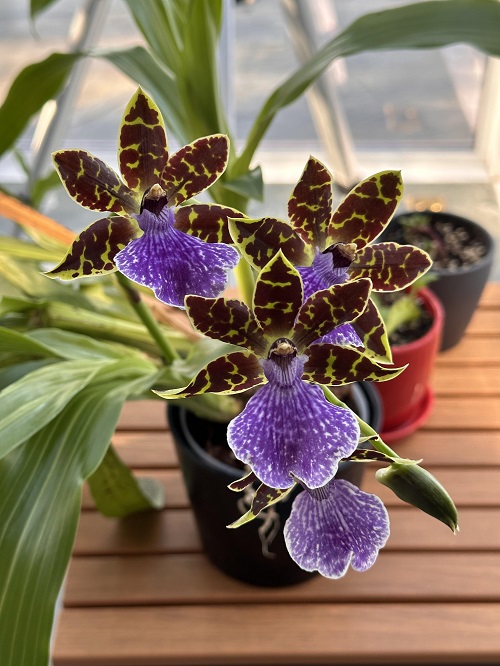
Botanical Name: Zygopetalum spp.
Zygopetalums are native to South and Central America. These night-blooming orchids’ flowers are cherished because they give off a scent similar to hyacinths or black pepper, which people love.
They produce long-lasting purple, green, or brown blooms during winter that last until late summer. If you’re growing them, don’t stick them in a cluttered space, as they thrive when there’s proper air circulation. You can also try this onion hack for never-ending flowers on your orchid.
5. Masdevallia Orchid
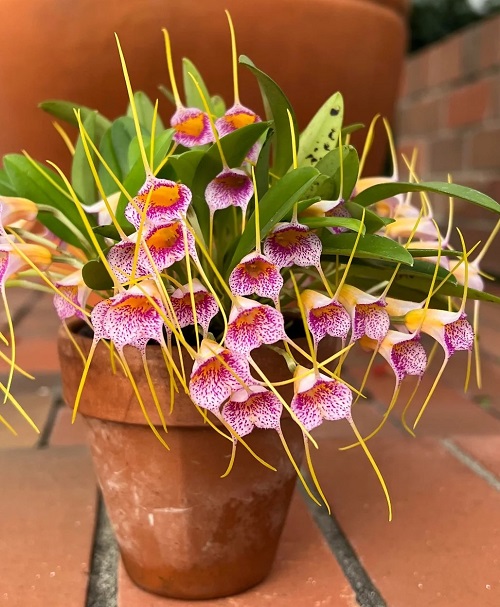
Botanical Name: Masdevallia spp.
Masdevallia orchids typically bloom in the spring, but you can make them bloom sporadically throughout the year. They are renowned for their gorgeous tube-like white and yellow flowers covered in pink patterns.
Masdevallias thrive in cool climates but need plenty of bright light to bloom in winter. To encourage them to re-bloom faster, you should maintain the temperature between 65-75 F (18-24 C) during the day and 50-60 F (10-16 C) at night.
6. Cattleya Orchid
Botanical Name: Cattleya spp.
Cattleya orchids bloom in different months depending on the species. Most of them bloom in the late summer or winter, but you can also find ones that flower in the spring or fall.
They need bright, indirect light and love the morning sun. However, avoid the harsh afternoon light as it can damage their delicate flowers. Good humidity will go a long way in keeping these thriving, so keep the pot on a tray filled with water and pebbles to increase it.
7. Slipper Orchids
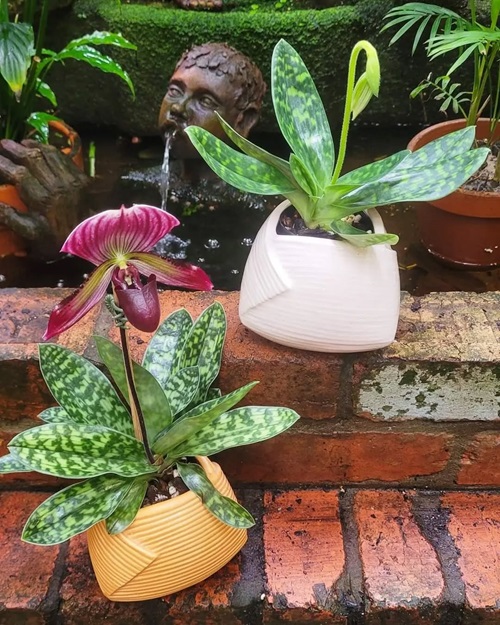
Botanical Name: Paphiopedilum spp.
Slipper orchids also bloom around the winter months. You can find spring or fall-blooming ones as well, but hybrids like Paphiopedilum insigne and Paphiopedilum spicerianum are best for winter blooms.
The name comes from the unique shape of their labellum, which resembles a pouch or slipper. The fusion of two petals forms this pouch, and it is often brightly colored and patterned to attract pollinators. Caring for them is easy; just don’t fertilize them if you notice these signs.
8. Oncidium Orchid
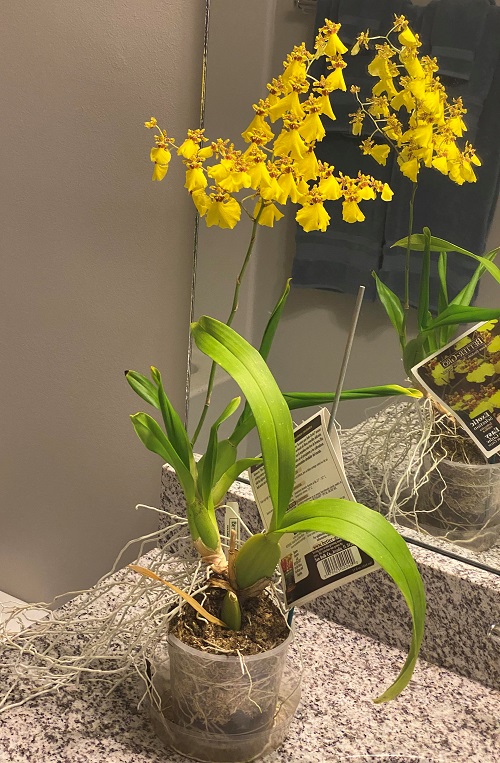
Botanical Name: Oncidium spp.
Native to South America, Central America, and Mexico, Oncidium orchids are also known as dancing lady orchids because their flowers resemble a dancing lady in a dress. They bloom in late summer, fall, and winter, but you can also find modern hybrids that bloom year-round.
It is usually best to keep them in east—or west-facing windows. You can also choose south-facing windows, but they will need some shading, especially in summer. And if you see any pests on your orchid, do this to get rid of them.
Which one of these winter-blooming orchids will you try growing first? Do let us know in the comments below!


